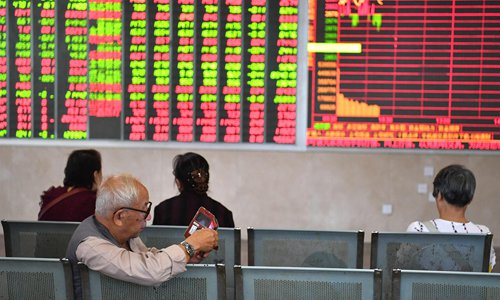HOME >> BUSINESS
China stocks rally on US rate cut
By Zhang Hongpei Source:Global Times Published: 2019/9/19 22:23:41
Beijing will not follow Fed move: analysts

Investors monitor stocks at a trading center in Chengdu, Southwest China's Sichuan Province on Wednesday. Photo: VCG
Stocks in the Chinese mainland edged up on Thursday following an overnight decision by the US Federal Reserve to cut interest rates for a second time this year, a move that analysts said could benefit China's capital market and help alleviate downward pressure on the yuan.The Shanghai Composite Index rose 0.46 percent and the Shenzhen Component Index gained 1.01 percent.
But it is not likely that the People's Bank of China (PBC), the country's central bank, will follow suit with any rate cut in the fourth quarter of the year, they said.
The Fed on Wednesday lowered interest rates by 25 basis points (bps) to a range of 1.75-2 percent amid growing risks and uncertainties stemming from the China-US trade war and a global economic slowdown.
It was the second time this year that the Fed cut rates, following a reduction in July that was its first since the global financial crisis of 2008.
"The second rate cut is what the market broadly expected, although it came within two months of the previous one, which reflects the US' rising downward economic pressure," said Liu Xuezhi, an economist at the Bank of Communications.
If the US economy weakens further, a "more extensive sequence" of rate cuts could be appropriate, said Fed Chair Jerome H. Powell.
US President Donald Trump, who has repeatedly requested a larger rate cut to boost the economy, lashed out at the Fed shortly after the announcement, saying in a tweet that "Jay (Jerome) Powell and the Federal Reserve Fail Again. No 'guts,' no sense, no vision! A terrible communicator!"
In response to the Fed, several central banks, including Brazil's, adjusted rates lower. Hong Kong's monetary authority reduced the basic lending rate by 25 bps to 2.25 percent on Thursday.
Meanwhile, the Bank of Japan kept monetary policy steady on Thursday, maintaining its short-term interest rate target at -0.1 percent.
The US move, which can be easily transmitted to the market based on its high level of rate marketization, is not an appropriate tool for China to use to boost growth, analysts said.
Yang Wang, a research fellow at the International Monetary Institute affiliated with the Renmin University of China, told the Global Times on Thursday that the PBC will flexibly use its monetary tools according to the fundamentals of China's economy rather than be forced to reduce rates under the influence of external factors.
"It is not likely that China will cut its interest rates in the short run to stimulate the economy, which faces downward pressure. Instead, tools such as medium-term lending facility loans and reform of the country's loan prime rate mechanism are more effective for the market," said Yang.
PBC Governor Yi Gang said in July that the country's interest rate level is appropriate and any policy change will depend on China's economic conditions.
According to Liu, China's move to cut the reserve requirement ratio (RRR) is a more effective way to target at the economy in releasing liquidity. "But if the last RRR cut cannot achieve optimal results in the fourth quarter, the central bank may think about an interest rate cut," Liu told the Global Times on Thursday.
The PBC announced earlier this month an RRR cut for financial institutions of 50 bps in a new effort to bolster the real economy.
"The easing of the global monetary environment will be favorable to the capital market and reduce some downward pressure on the yuan," said Liu.
Yang Delong, chief economist at Shenzhen-based First Seafront Fund Management Co, told the Global Times on Thursday that as the global economy slows, China's stock and bond markets are becoming relatively more attractive and more foreign capital is set to flow in.
Posted in: ECONOMY